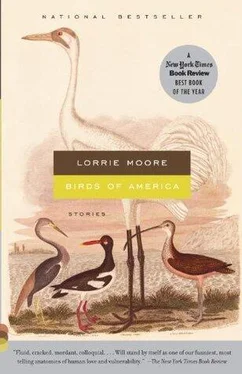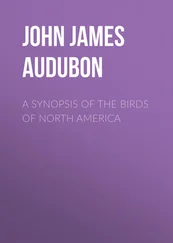Something chokes up in him. There can be optimism in the increments, the bits, the chapters; but I haven’t seen him in twelve years and he has had to tell me the whole story, straight from the beginning, and it’s the whole story that’s just so sad.
“We both carried the gene but never knew,” he says. “That’s the way it works. The odds are one in twenty, times one in twenty, and then after that, still only one in four. One in sixteen hundred, total. Bingo! We should move to Vegas.”
When I first knew Cal, we were in New York, just out of graduate school; he was single, and anxious, and struck me as someone who would never actually marry and have a family, or if he did, would marry someone decorative, someone slight. But now, twelve years later, his silver-haired wife, Simone, is nothing like that: she is big and fierce and original, joined with him in grief and courage. She storms out of PTA meetings. She glues little sequins to her shoes. English is her third language; she was once a French diplomat to Belgium and to Japan. “I miss the caviar” is all she’ll say of it. “I miss the caviar so much.” Now, in Pennsylvania Dutchland, she paints satirical oils of long-armed handless people. “The locals,” she explains in her French accent, giggling. “But I can’t paint hands.” She and Eugene have made a studio from one of the wrecked rooms upstairs.
“How is Simone through all this?” I ask.
“She’s better than I am,” he says. “She had a sister who died young. She expects unhappiness.”
“But isn’t there hope?” I ask, stuck for words.
Already, Cal says, Eugene has degenerated, grown worse, too much liquid in his lungs. “Stickiness,” he calls it. “If he were three, instead of seven, there’d be more hope. The researchers are making some strides; they really are.”
“He’s a great kid,” I say. Across the street, there are old Colonial houses with candles lit in each window; it is a Pennsylvania Dutch custom, or left over from Desert Storm, depending on whom you ask.
Cal stops and turns toward me, and the dog comes up and nuzzles him. “It’s not just that Eugene’s great,” he says. “It’s not just the precocity or that he’s the only child I’ll ever have. It’s also that he’s such a good person. He accepts things. He’s very good at understanding everything.”
I cannot imagine anything in my life that contains such sorrow as this, such anticipation of missing someone. Cal falls silent, the dog trots before us, and I place my hand lightly in the middle of Cal’s back as we walk like that through the cold, empty streets. Up in the sky, Venus and the thinnest paring of sickle moon, like a cup and saucer, like a nose and mouth, have made the Turkish flag in the sky. “Look at that,” I say to Cal as we traipse after the dog, the leash taut as a stick.
“Wow,” Cal says. “The Turkish flag.”
“You’re back, you’re back!” Eugene shouts from inside, dashing toward the front door as we step up onto the front porch with Chappers. Eugene is in his pajamas already, his body skinny and hunched. His glasses are thick, magnifying, and his eyes, puffed and swimming, seem not to miss a thing. He slides into the front entryway, in his stocking feet, and lands on the floor. He smiles up at me, all charm, like a kid with a crush. He has painted his face with Merthiolate and hopes we’ll find that funny.
“Eugene, you look beautiful!” I say.
“No I don’t!” he says. “I look witty .”
“Where’s your mother?” asks Cal, unleashing the dog.
“In the kitchen. Dad, Mom says you have to go up to the attic and bring down one of the pans for dinner.” He gets up and chases after Chappers, to tackle him and bring him back.
“We have a couple pots up there to catch leaks,” Cal explains, taking off his coat. “But then we end up needing the pots for cooking, so we fetch them back.”
“Do you need some help?” I don’t know whether I should be with Simone in the kitchen, Cal in the attic, or Eugene on the floor.
“Oh, no. You stay here with Eugene,” he says.
“Yeah. Stay here with me.” Eugene races back from the dog and grabs my leg. The dog barks excitedly.
“You can show Eugene your video,” Cal suggests as he leaves the room.
“Show me your dance video,” he says to me in a singsong. “Show me, show me.”
“Do we have time?”
“We have fifteen minutes,” he says with great authority. I go upstairs and dig it out of my bag, then come back down. We plug it into the VCR and nestle on the couch together. He huddles close, cold in the drafty house, and I extend my long sweater around him like a shawl. I try to explain a few things, in a grown-up way, how this dance came to be, how movement, repeated, breaks through all resistance into a kind of stratosphere: from recalcitrance to ecstasy; from shoe to bird. The tape is one made earlier in the week. It is a demonstration with fourth graders. They each had to invent a character, then design a mask. They came up with various creatures: Miss Ninja Peacock. Mr. Bicycle Spoke Head. Evil Snowman. Saber-toothed Mom: “Half-girl-half-man-half-cat.” Then I arranged the kids in a phalanx and led them, with their masks on, in an improvised dance to Kenny Loggins’s “This Is It.”
He watches, rapt. His brown hair hangs in strings in his face, and he chews on it. “There’s Tommy Crowell,” he says. He knows the fourth graders as if they were royalty. When it is over, he looks up at me, smiling, but businesslike. His gaze behind his glasses is brilliant and direct. “That was really a wonderful dance,” he says. He sounds like an agent.
“Do you really think so?”
“Absolutely,” he says. “It’s colorful and has lots of fun, interesting steps.”
“Will you be my agent?” I ask.
He scowls, unsure. “I don’t know. Is the agent the person who drives the car?”
“Dinner’s ready!” Simone calls from two rooms away, the “Wank me with a spoon” room.
“Coming!” shouts Eugene, and he leaps off the couch and slides into the dining room, falling sideways into his chair. “Whoo,” he says, out of breath. “I almost didn’t make it.”
“Here,” says Cal. He places a goblet of pills at Eugene’s place setting.
Eugene makes a face, but in the chair, he gets up on his knees, leans forward, glass of water in one hand, and begins the arduous activity of taking all the pills.
I sit in the chair opposite him and place my napkin in my lap.
Simone has made a soup with hard-boiled eggs in it (a regional recipe, she explains), as well as Peking duck, which is ropy and sweet. Cal keeps passing around the basket of bread, anxiously, talking about how modern man has only been around for 45,000 years and probably the bread hasn’t changed much since then.
“Forty-five thousand years?” says Simone. “That’s all? That can’t be. I feel like we’ve been married for that long.”
There are people who talk with their hands. Then there are people who talk with their arms. Then there are people who talk with their arms over their head. These are the ones I like best. Simone is one of those.
“Nope, that’s it,” says Cal, chewing. “Forty-five thousand. Though for about two hundred thousand years before that, early man was going through all kinds of anatomical changes to get where we are today. It was a very exciting time.” He pauses, a little breathlessly. “I wish I could have been there.”
“Ha!” exclaims Simone.
“Think of the parties,” I say.
“Right,” says Simone. “ ‘Joe, how’ve you been? Your head’s so big now, and, well, what is this crazy thing you’re doing with your thumb?’ A lot like the parties in Soda Springs, Idaho.”
Читать дальше












